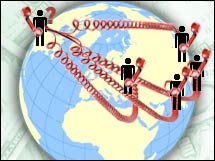Study says U.S. tech hiring grows
Trade group reports that domestic increase in technology jobs offsets the work being sent overseas.
NEW YORK (CNNMoney.com) - Demand for technology workers in the United States continues to grow in spite of American companies shifting more technology work overseas, according to a new study. The Association for Computing Machinery, a professional development organization that includes academic, government and industry officials from the information technology field, released a study Thursday that said that shifting IT jobs to countries like India or China is not nearly the threat to workers here that is commonly believed.
The study cites estimates that between two to three percent of IT jobs will be lost annually to lower-wage developing countries through the process known as offshoring. But it said the U.S. IT sector's overall growth should outpace that loss of jobs, expanding opportunities for those trained in fields such as software architecture, product design, project management and IT consulting. "Despite all the publicity in the United States about jobs being lost to India and China, the size of the IT employment market in the United States today is higher than it was at the height of the dot.com boom," said the report. "Information technology appears as though it will be a growth area at least for the coming decade, and the U.S. government projects that several IT occupations will be among the fastest growing occupations during this time." And even with greater globalization, the report argues that the lower wage scales in India and China are not pushing down pay for U.S. IT workers. Citing information from the U.S. Bureau of Labor Statistics, it said that IT workers have seen steady gains in average annual wages for different fields in the sector of between about two to five percent a year. The study suggests that there are several factors in the continued growth in demand for IT workers here. The report said part of it is due to the use of offshoring by U.S. companies, including start-up firms, to limit their costs and thus grow their businesses. That, in turn, creates more opportunities here even as an increasing amount of work is done overseas. The study also said that companies from a variety of sectors in the economy continue to discover greater efficiency and more competitive operations through investment in IT. The study therefore argues there will be continued growing demand for IT as underserved fields such as health care, retail trade, construction, and certain services make greater investment in technology. The study said while there has been a lot of technological progress in recent years, such as low-cost broadband links with India and China, there are still a number of reasons U.S. companies will want to keep some IT jobs at home, including job processes that are not routine or the need to have face-to-face interaction for a specific job. One of the greater threats to IT growth in the United States is the belief by many parents and young people that the field does not have good job prospects, which has resulted in a decline in students choosing to study various IT fields. It also sees tighter visa restrictions forcing more IT work offshore because fewer foreign students will be able to come here to study and provide the skill workers companies are looking for. "In the past, one of the great advantages of the United States has been its higher education system. The United States still holds some significant advantages over India in the higher educational system," said the study. "For many years, the United States has been considered the place of choice for advanced degrees for people throughout the world, but this seems to be changing. Because of visa tightening and attitudes towards the United States in the post-9/11 era, the number of foreign students applying to graduate school in the United States has plummeted."
For a look at how offshoring is affecting investment banking, click here. |
| |||||||||

